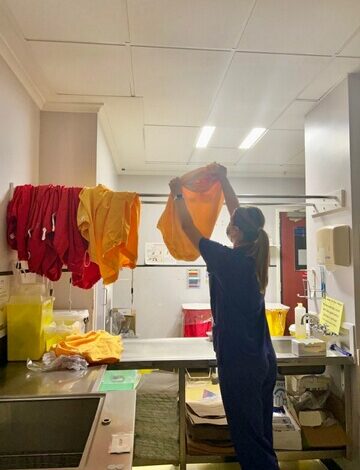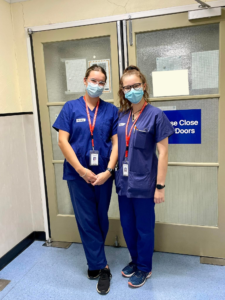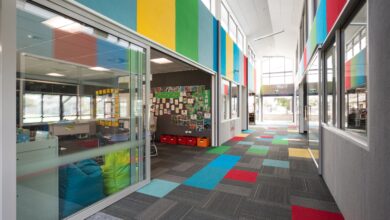
A new collaboration between the Canterbury District Health Board and Ara’s Department of Health Practice means that nursing students can help with the Covid-19 response at Christchurch Hospital.
From this week, second-year nursing students can now be employed as Healthcare Assistants, earning both wages and clinical hours towards their Ara nursing degree.
The programme is helping supplement the health workforce at a critical time in the pandemic, with modelling showing that up to 8-15% of the Canterbury DHB workforce could be affected by Covid-19 and other illness at any one time.
“Last year, in response to the impact of the pandemic on nursing, the Nursing Council introduced a new Registered Nurse Programme Education Standard which recognises paid employment as clinical hours in the case of an emergency of national significance.
“This allowed us to work with the Canterbury DHB when it became clear that there were going to be significant workforce issues in relation to staff illness or isolation due to the pandemic,” explains Karen Edgecombe, Academic Manager at Ara’s Department of Health Practice.
For Grace Fissenden, 20, being part of this new initiative will represent her third placement as part of her degree programme, but it will be the first time she’s been paid.
“It’s a great help to a lot of students who are living off their student loans or off their summer earnings. I’ll be using some of my wages for rent and then save up for other expenses throughout the whole year,” she says.
Another benefit of the programme for Fissenden is understanding the role of the Healthcare Assistants (HCAs).
“Instead of being a nursing student when you are so busy providing nursing care alongside the nurses, the HCAs get to spend more time with the patients, washing them, mobilising them, and providing basic care. I like how personal it can be. Also, as a soon-to-be nurse, it’s good for me to take notice of how important the HCAs are to patient care,” she says.
Edgecombe says that the nursing students work under the direction of a Registered Nurse as well as a clinical lecturer who helps them link their knowledge through the work practice.

“Nursing is changing because of the pandemic,” she says. “This is a unique situation and a chance for our students to see how this is happening for themselves. It also demonstrates the strength of our relationship with the Canterbury DHB – another example of how we work together to address the changing needs of healthcare.”
Canterbury DHB Executive Director of Nursing, Becky Hickmott, says the Ara – Canterbury DHB collaboration sends a powerful message about the ability to work together in emergency situations.
“Since 2011 in a post-quake Canterbury, through the terrorist attacks, and now in a global pandemic, Ara students have come out in force to help and support our workforce. We would’ve really been stuck without them.”
“Now, we’re seeing the impact of Omicron on our staffing levels,” Hickmott says. The HCA roles are really instrumental to the health system, so having these well-prepared, professional students working with us brings a lot of value, while also helping with their education. Ara students are our students. At the end of their degrees, we see high quality professionals who are ready to work.”
Edgecombe says that this collaboration demonstrates Ara’s leadership in the nursing sector.
“Ara was the first to put nursing students into MIQ facilities. We were the first to enable them to become provisional vaccinators. And now we’re giving them a chance to really see how to respond to Covid-19 on the wards themselves where they can contribute to the pandemic, supporting their community and making a difference.”









